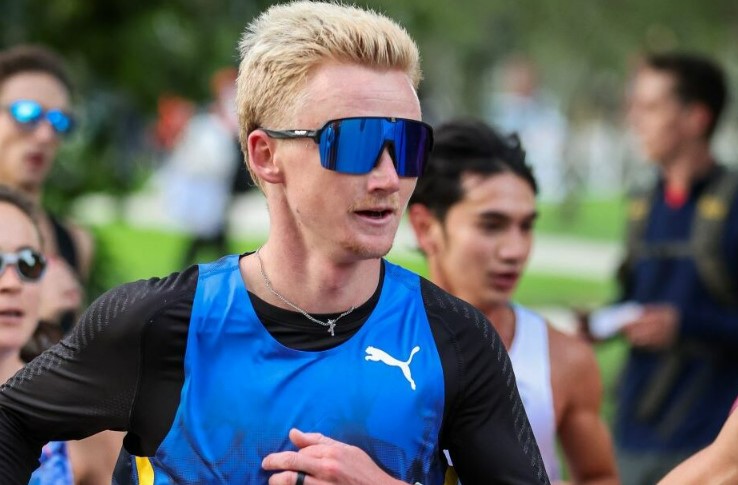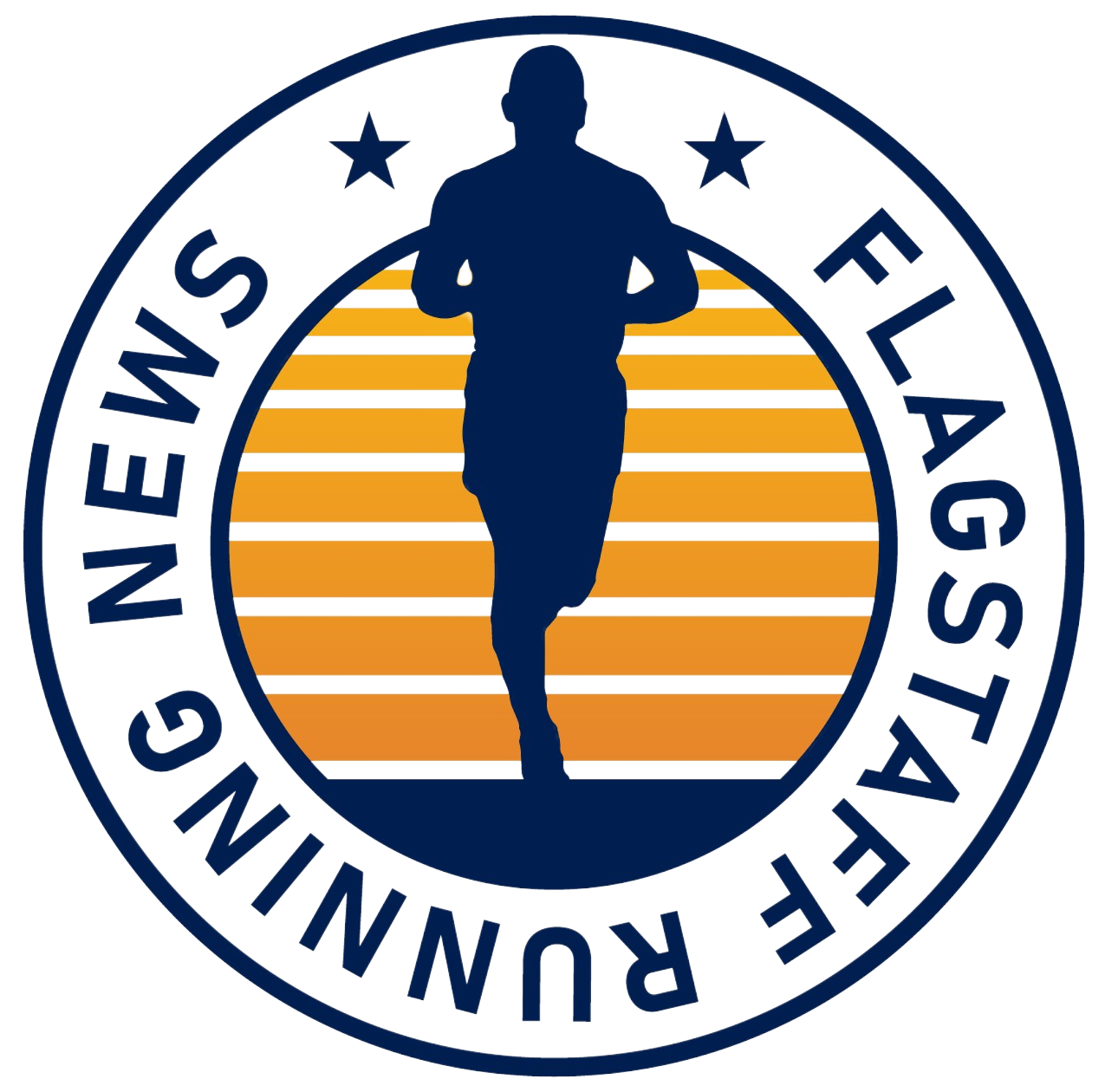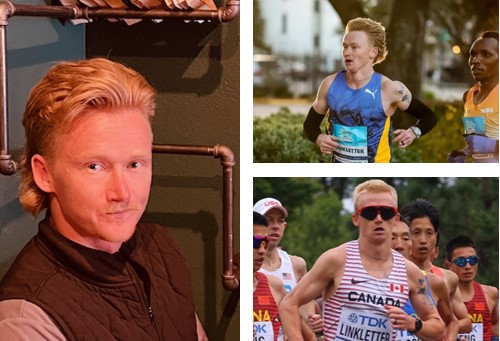The Canadian, who lives and trains in Flagstaff, set the Olympic standard in dramatic fashion in February at Seville
So now the waiting continues for Rory Linkletter. In one month, just one more, the marathon qualification window slams shut and he will, in all likelihood, stop having to wait and start training in earnest for this August’s Olympic marathon as part of Team Canada.
Officially, that is.
In reality, Linkletter, the 27-year-old Flagstaff-based runner coached by Ryan Hall, has gone on the assumption he will be selected by Athletics Canada for his first Olympic Games. Barring unforeseen development – two Canadians running under Linkletter’s time of 2:08:01 between now and May 5 – his standard-setting time last month in a gutsy, seconds-splitting performance at the Seville Marathon will do.
Since Seville, Linkletter’s mindset has been that he’ll be in Paris this summer, but he’s polite enough (hey, he is an affable Canadian, after all) to still put a qualifier on his qualification speaking on numerous podcasts and on his own YouTube video channel.
For the record, though, he and Levins are the only Canadian men with the standard. The closest competitor to Linkletter is Ben Preisner, who ran 2:08:52 in Japan in February and will try one last time to get the standard at the Hamburg Marathon on April 28. Another Canadian, Tristan Woodfine, is running Boston on April 15, but he will have to finish in the top five because Boston’s course does not count as a time qualifier.
Enough with the what-ifs. It takes attention away from Linkletter’s accomplishment, his mercurial rise among North American marathoners the past two years under Hall’s guidance after stagnating as a member of Hoka NAZ Elite. It certainly won’t distract the laser-focused Linkletter from for big goal: a top-10 finish in Paris.
Still, there’s something to be said, something special, in having everything formalized and officially being christened an Olympian.
Sipping coffee Friday at White Dove in Flagstaff, musing on what lies ahead for him this summer, Linkletter did at one point look down at his watch face and notice the date.
“Hey,” he said, a half-smile spreading across his face upon realizing the date, “exactly one month to go.”
The more important time stamp is not the May 5 qualification closing; it’s that it’s roughly four months until he toes the starting line in Paris. He’s just now embarking on his Paris build-up, which in the next month will see him run a half marathon in Japan and two Canadian 10K Championships (road and track).
Putting in speed work early – he broke four minutes in the mile for the first time recently — helped him gain confidence during his Seville build, he said. He’s hoping for the same script to play out this spring and early summer.
If the trajectory of his training continues as it has, watch out: Linkletter just might make good on that top-10 finish goal in what is being hyped as the most competitive men’s Olympic marathon in memory.
Just making the Olympic team, special as it is, is not enough for Linkletter anymore. He will take some time to savor the official announcement, but having an Olympic pedigree in his bio is more for other people than himself.
“I’ve been operating under the assumption,” he said, “but it’ll be cool to have it official so that every time I say it, I’m not knocking on wood, some weight off the shoulders, you know.
“Everybody circles (the Olympics) for four years. And when you do this as your job, the casual people in your life, your uncle, aunt, the distant friend high school, that’s what they understand -– that entry-level understanding. There’s much more to (pro distance running), but for the layman, it’s an entry.
“It’s validating because I don’t have to explain what I’m doing to so many people. I can just say, ‘Yeah, I’m an Olympian’, and they’ll understand. The title is valuable, it’s like having a Ph.D, a rare title that you have to work really hard to achieve.”
Hard work is a given with Linkletter, born and raised in Calgary for his first five years before moving to Utah. He’s always been a grinder, an overachiever, willing to do whatever it takes to accomplish his goals. He didn’t even get a scholarship (other than money for books) when he first went to BYU, was really an afterthought on a team stacked with talent, but then emerged to be a leader and placed second one year in the NCAA 10,000 meters. He pretty much flew under the radar his first few years as a pro with NAZ Elite, showing promise but hardly logging eye-popping times.
So, Linkletter is used to delayed gratification, for putting in the time and the miles hoping it would eventually pay off.
“This sport,” he said, “rewards patience and adaptation over time.”
The rewards he’s reaping now seem that much sweeter because of the long road it took to get there.
“This sport rewards patience and adaptation.”
Rory Linkletter
Linkletter is one of the few North American runners that focused almost solely on the marathon straight out of a college. Though starting marathon racing in the early 20s, or even late teens, is somewhat more common among East Africans, here it’s not standard. Runners feel the need to gradually build to the marathon, running 10K and 5K on the track for at least a few years. But Linkletter already has that experience at 27, and he’ll be only 31 and in his prime (presumably) for the 2028 Games in Los Angeles.
Linkletter, however, knew all along where his future lay in the marathon and, though just 23 when he signed with NAZ Elite, he was making progress training with the likes of Americans Scott Fauble and Scott Smith. His marathon debut was a 2:16:42 effort in Toronto in 2019, and he hit 2:12 during the Covid-inspired Marathon Project in Chandler in 2020.
Stagnation – and its concomitant cousin, frustration – soon followed. Linkletter was training well but racing poorly, a pattern that dogged him throughout 2021. He said he felt stuck and at wit’s end. The nadir came at the 2021 Boston Marathon, held in October that year, when he ran an eye-popping (not in a positive way) 2:23:34 for 33rd place. It was a rough day all around for NAZ Elite, with Fauble finishing a disappointing 16th and Smith 17th.
In the aftermath, piecing through the wreckage, Linkletter knew a change was in the offing.
He needed, he said, to leave NAZ Elite – Fauble did the same, relocating to Colorado – but somehow stay in Flagstaff, a town he and wife Jill had grown to love. It would be a risky move, leaving a stable shoe contract with Hoka and venturing forth unattached. It was a period of emotional upheaval, too. His father was diagnosed with colon cancer and passed away, and Jill became pregnant with the couple’s first child.
Talk about some heavy life changes. What was Linkletter to do?
“There were a lot of things building towards that,” Linkletter said. “Basically, (Boston) was the straw that broke the camel’s back. I had a rough year in a lot of arenas of life. I was running horribly. I did a track season and couldn’t even piece together 6K of a 10K. My training and racing didn’t seem to match up. I was training well, then going to race and feeling like I was drowning, immediately. There was a disconnect.
“You see a pattern and think, ‘I just need a change.’ The way I viewed it was, if I don’t make a change myself now, I’m not going to have time (later) to make a change. Your time in this sport? There are no guarantees.”
His first decision was to find a new coach. Though Linkletter greatly admires his college coach, Ed Eyestone (who coaches Olympians and Linkletter ex-teammates Conner Mantz and Clayton Young), he felt Eyestone was a little too hands-off in his approach. And, besides, he wanted to stay in Flagstaff, joking that “five years in Provo was enough.”
“I joke that I feel like almost a member of a cult, because I’d follow him fearlessly. I love the man and admire him. He’s done amazing things for me as a human and an athlete. It almost makes me emotional, thinking where I was when I joined him and where I am now.”
Linkletter on coach Ryan Hall
Then again, Linkletter didn’t want a repeat of the rigid training blocks of NAZ Elite, where every workout was mapped out and adhered to. There, of course, are other formal training groups in Flagstaff (Under Armour Dark Sky Distance and McKirdy Trained), but Linkletter chafed at being part of an established team again.
An intriguing thought kept tantalizing him.
What about Ryan Hall, the former U.S. Olympic marathoner who coaches his wife Sara, an elite marathoner.
Would Hall take him on?
“I thought he embodied some of the ideas that I valued,” Linkletter said of Hall, “but mostly I appreciated his success as an athlete. I’d heard almost folklore of what he was like (as a marathoner) through the grapevine. He was hard-core, right, and that’s what I wanted. He exceeded my expectations.”
So, Linkletter now had a coach in Hall, who was open to flexible workouts and varying mileage – sort of the happy medium between Eyestone and NAZ Elite’s Ben Rosario.
The initial training was promising, but Linkletter still had a lot of pressure to prove himself – and convince a shoe company to sign him. After all, he now had a family to feed and a mortgage on a house in Doney Park. His agent, Hawi Keflezighi (Meb’s brother), was working hard trying to forge an endorsement deal – but so was Linkletter, pounding it out on the roads.
In his first race under Hall’s tutelage, Linkletter set a then-Canadian half marathon record by running 1:01.08 in January, 2022, at the Houston Half. He kept racing, kept putting up promising times and waiting for a possible deal.
“I told myself I’d race like crazy for exposure until someone signed me,” he said. “It was four months, and then … Puma. I discovered they are very fair with their athletes, and they put out a good product, which, frankly, was important to me.”
Linkletter signing with Puma was a game-changer for him, he said. He felt secure now staying and training in Flagstaff.
“It’s a great place to live and train beyond the 7,000-foot thing,” Linkletter said. “I’ve got an infrastructure here – physical therapists, strength trainer, everything. There’s no place I could think of that makes as much sense as Flagstaff. After NAZ, I wanted more control and autonomy. The perfect scenario for me is having a non-formal group. It’s pretty laid back.”
Actually, Hall has assembled an informal, unnamed group, of about six now, but Linkletter is the only full-time male marathoner (Biya Simbassa recently moved up to the distance). For the first year or so, Hall and Linkletter fine-tuned their coach-runner relationship, Linkletter taking guidance on workouts and Hall being flexible on aspects such as recovery. There have only been a few hiccups; Linkletter had to withdraw from London in 2023 with an IT band issue, but mostly his training has been seamless and productive.
The goal all along was to get the Olympic standard. And, along the way, Linkletter represented Canada twice in World Championship marathons, finishing 18th in hot, humid Budapest in 2023 and 20th in Eugene in 2022. The build toward Seville included speedwork, followed by marathon-specific workouts.
One indication that Linkletter was ready for a breakthrough in Seville was his tune-up half marathon in Houston in January, when he ran a PR, 1:01:02. That bolstered his confidence heading into the marathon. But Hall, too, was a continuous source of positivity and confidence-building, Linkletter said.
“My approach to training has drastically changed under Ryan,” he said. “We’ve found a cool balance in my influence in training and my trust in him.”
Trust is the key word here. Linkletter has trusted Hall’s judgment more than any other coach he’s had.
“I told Ryan this after Seville, I said, ‘You were an incredible athlete; you’re a better coach than you were an athlete,’” Linkletter said. “Ryan is interesting. He seems not to need to coach; he does it for fun. And I think, ‘Man, what would happen to me if this guy one day decides he doesn’t want to coach anymore?’ I don’t know what I’d do.
“I joke that I feel like almost a member of a cult, because I’d follow him fearlessly. I love the man and admire him. He’s done amazing things for me as a human and an athlete. It almost makes me emotional, thinking where I was when I joined him and where I am now. Now, my training and racing are matching up. When I’ve raced under Ryan, if I’ve had good training, I’ll have good racing. I can almost predict it. Now, I can step to the line after training and go, ‘Yup, I’m ready.’”
Seville proved that.

His Olympic-standard achievement drew headlines in Canada, but it wasn’t quite as celebrated in his adopted country. (Linkletter attained dual citizenship in the U.S. in 2021.) Given that Linkletter moved to Utah from Calgary at age 5, how Canadian does he feel?
Very Canadian, it turns out.
“When I was a young kid, I’d go home to see me dad in Calgary so many times a year, that it was what was unique about me,” said Linkletter, whose parents had divordes and whose mom moved to Utah upon remarrying. “People knew me as the kid who’s Canadian. That made me different than my peers in Utah.
“When I started competing internationally, there was no option for me to choose the U.S. It was Canada or nothing. They’ve adopted me as their own. This first time I made a team, people were scratching their heads saying, ‘Where are you from again?’ … I used to be self-conscious about it because I wanted to feel like I belonged there. I don’t feel that way anymore. I know why I represent Canada and what it means to me and my family.
“I’m as Canadian as it gets as far as family roots go. Both my parents were Canadian and every aunt, uncle, grandparent, as far back as I can go is Canadian.”
Still, when Linkletter watched the U.S. Olympic trials in early February and saw his two former BYU teammates, Mantz and Young, in the lead, part of him couldn’t help but wonder how he would have fared if he raced as an American.
“Obviously, I’ve been in the US running scene so long that, I’ve raced all those guys,” he said. “So, in a way, I’m part of the U.S. running scene, but I’m like that I’m different in the fact I represent Canada. It’s a differentiator for me. But part of my thinks, ‘Yeah, it would be cool to prove that I could make that team as well.’ There is a caveat in our sport, like, well making that team is easier than this team. I think making the Olympics, especially in the marathon with the standard set at 2:08:10, you know, anyone who makes it is making it on a tough standard. It’s the most exclusive club to enter.”
Linkletter looks to Levins as a model of the kind of global running force he wants to be. Levins now is competitive for major-marathon podiums, and Linkletter hopes to emulate that.
“I think I’m on my way, hopefully,” he said.
One steppingstone he’s yet to achieve is winning a Canadian championship – he’s finished second twice – which is why he’s peppering his Paris marathon training by entering the Canadian 10K track and road championships this spring. It’ll be good prep for Paris; plus, Linkletter said he loves racing against friend and rival Ben Flanagan.
After those races, though, thoughts turn solely to Paris and its hilly (and probably humid) course. Training in Flagstaff doesn’t have the humidity, but it certainly has the hills.
So, you’ll see Linkletter running up Snow Bowl Road, ascending the Marshall Lake turnoff off of Lake Mary Road and out at Sunset Crater and maybe even chuffing up Mount Elden Road.
“It’s still so far away,” Linkletter said of the Olympic men’s marathon, slated for Aug. 10. “I’m doing the groundwork now to set me up for throwing in marathon workouts.”
Of course, his spot is not official.
Yet.
But, really, it is.


Leave a Reply